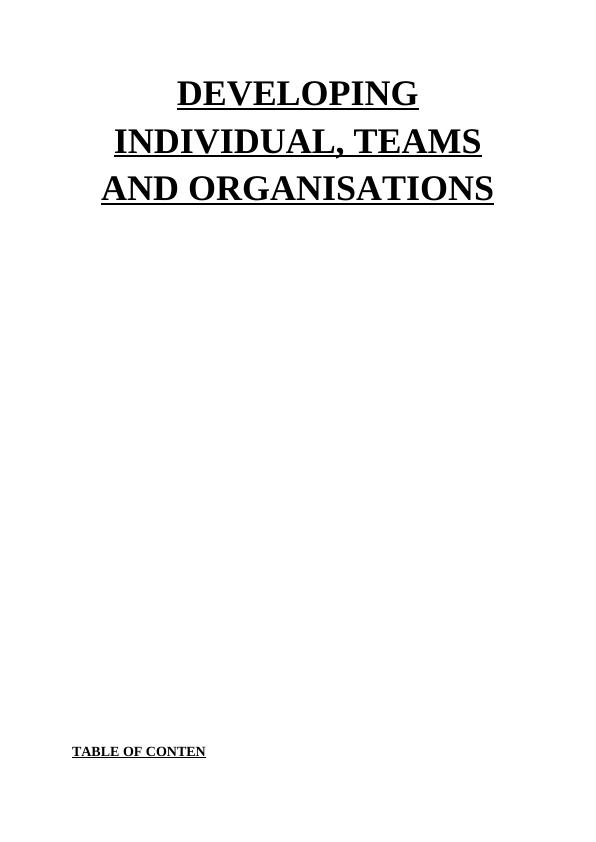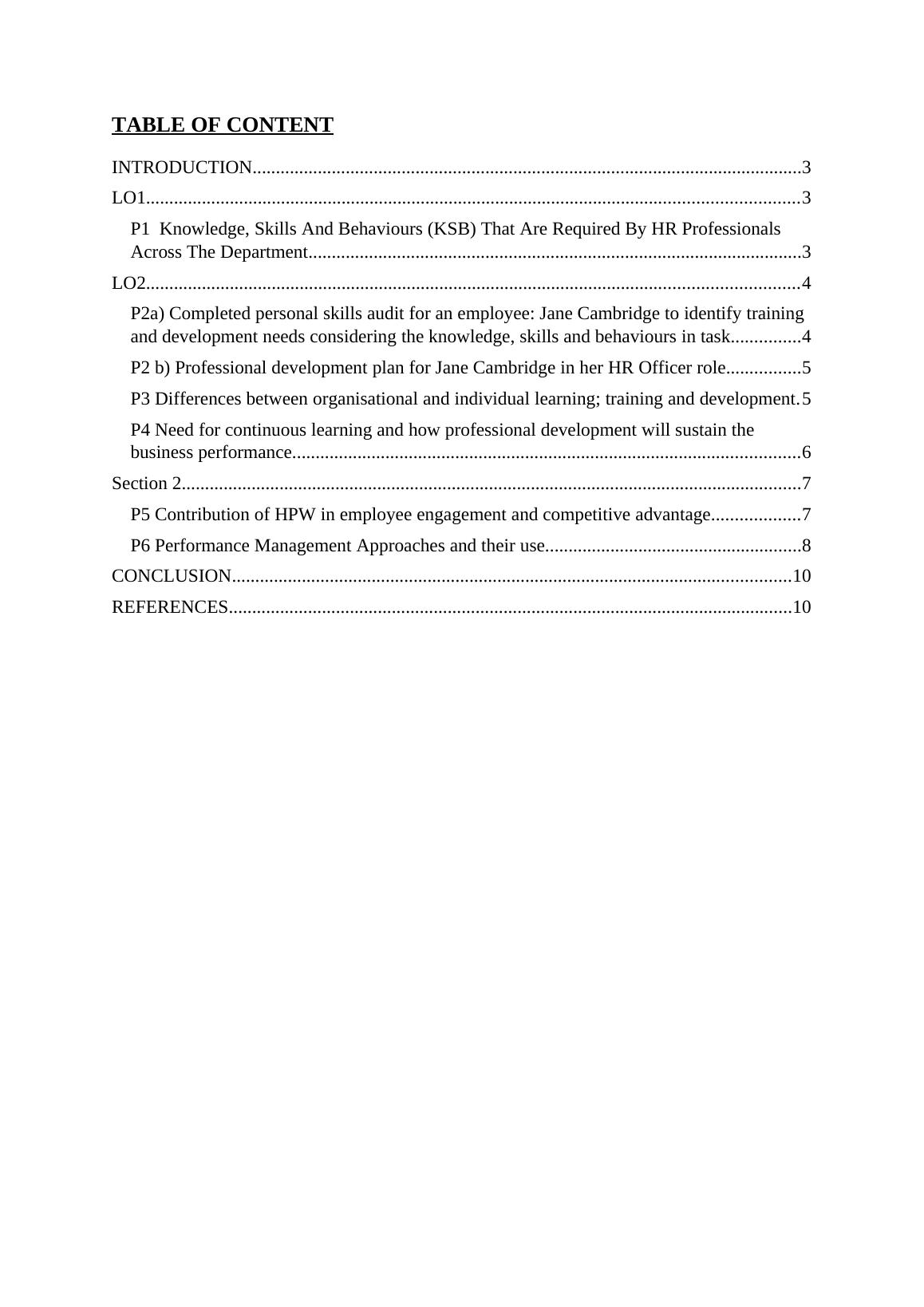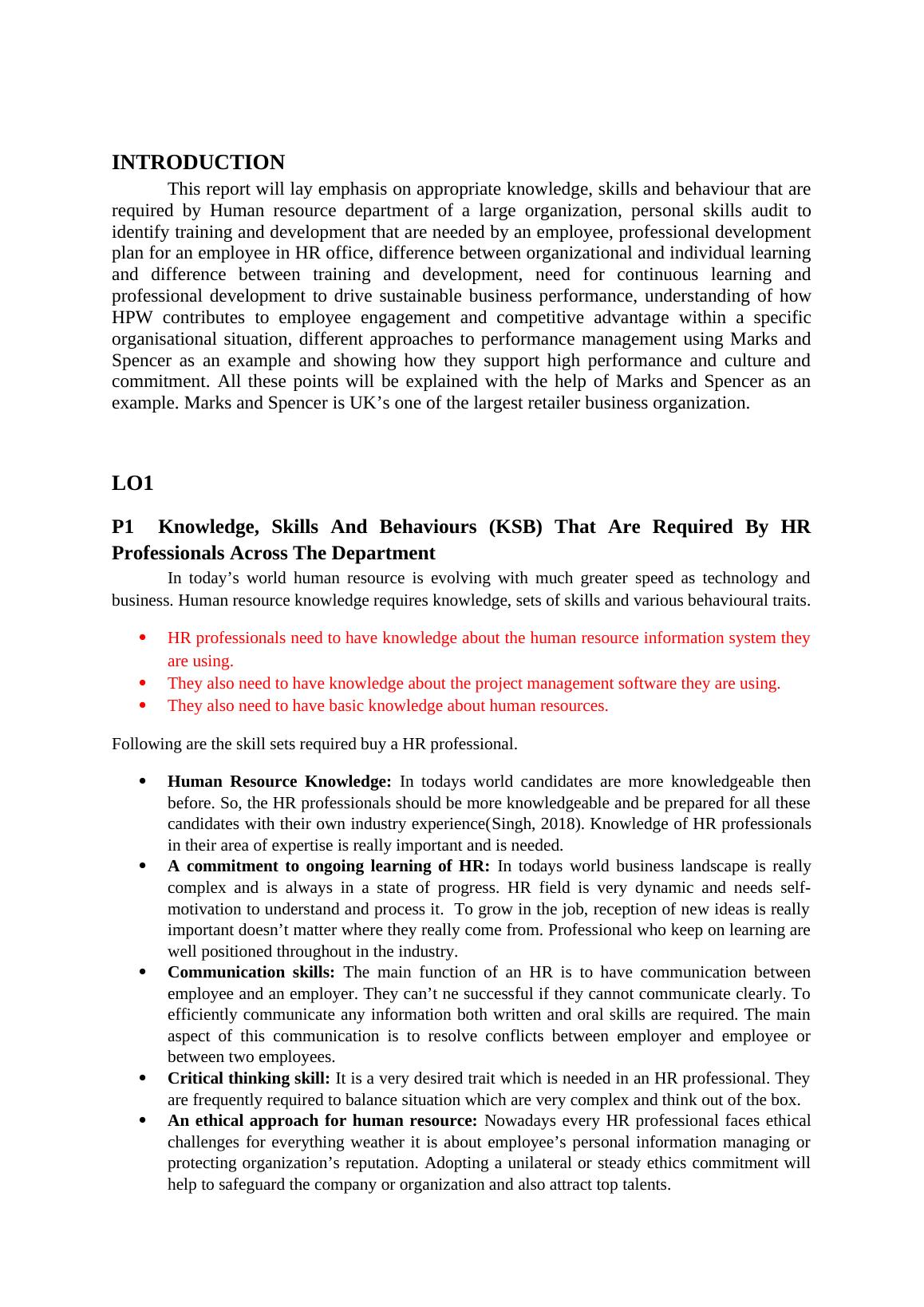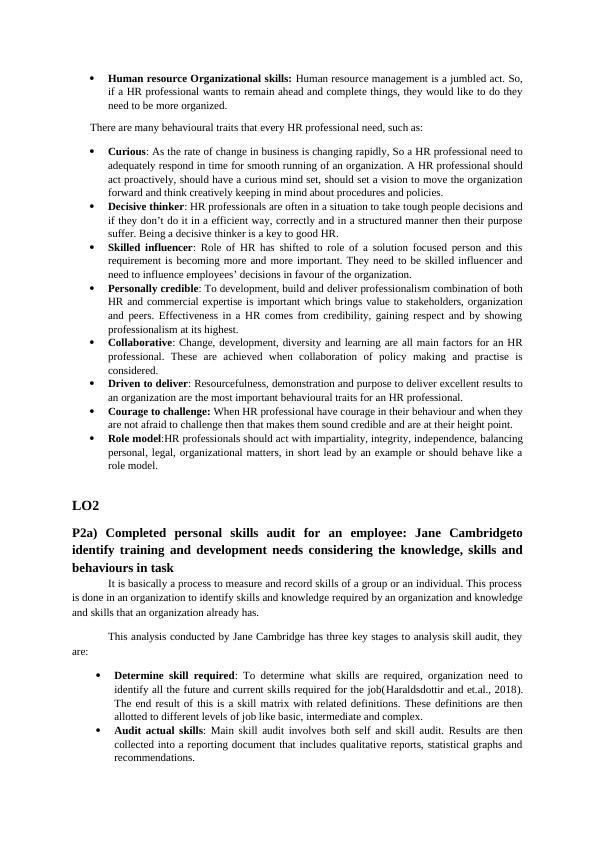Ask a question from expert
Developing Individual, Teams and Organisations & KSB
11 Pages3890 Words417 Views
Added on 2020-11-12
Developing Individual, Teams and Organisations & KSB
Added on 2020-11-12
BookmarkShareRelated Documents
DEVELOPINGINDIVIDUAL, TEAMSAND ORGANISATIONSTABLE OF CONTEN

INTRODUCTION......................................................................................................................3LO1............................................................................................................................................3P1 Knowledge, Skills And Behaviours (KSB) That Are Required By HR Professionals Across The Department..........................................................................................................3LO2............................................................................................................................................4P2a) Completed personal skills audit for an employee: Jane Cambridge to identify training and development needs considering the knowledge, skills and behaviours in task...............4P2 b) Professional development plan for Jane Cambridge in her HR Officer role................5P3 Differences between organisational and individual learning; training and development.5P4 Need for continuous learning and how professional development will sustain the business performance.............................................................................................................6Section 2.....................................................................................................................................7P5 Contribution of HPW in employee engagement and competitive advantage...................7P6 Performance Management Approaches and their use.......................................................8CONCLUSION........................................................................................................................10REFERENCES.........................................................................................................................10

INTRODUCTIONThis report will lay emphasis on appropriate knowledge, skills and behaviour that arerequired by Human resource department of a large organization, personal skills audit toidentify training and development that are needed by an employee, professional developmentplan for an employee in HR office, difference between organizational and individual learningand difference between training and development, need for continuous learning andprofessional development to drive sustainable business performance, understanding of howHPW contributes to employee engagement and competitive advantage within a specificorganisational situation, different approaches to performance management using Marks andSpencer as an example and showing how they support high performance and culture andcommitment. All these points will be explained with the help of Marks and Spencer as anexample. Marks and Spencer is UK’s one of the largest retailer business organization.LO1P1 Knowledge, Skills And Behaviours (KSB) That Are Required By HRProfessionals Across The DepartmentIn today’s world human resource is evolving with much greater speed as technology andbusiness. Human resource knowledge requires knowledge, sets of skills and various behavioural traits.HR professionals need to have knowledge about the human resource information system theyare using.They also need to have knowledge about the project management software they are using.They also need to have basic knowledge about human resources.Following are the skill sets required buy a HR professional.Human Resource Knowledge: In todays world candidates are more knowledgeable thenbefore. So, the HR professionals should be more knowledgeable and be prepared for all thesecandidates with their own industry experience(Singh, 2018). Knowledge of HR professionalsin their area of expertise is really important and is needed.A commitment to ongoing learning of HR: In todays world business landscape is reallycomplex and is always in a state of progress. HR field is very dynamic and needs self-motivation to understand and process it. To grow in the job, reception of new ideas is reallyimportant doesn’t matter where they really come from. Professional who keep on learning arewell positioned throughout in the industry.Communication skills: The main function of an HR is to have communication betweenemployee and an employer. They can’t ne successful if they cannot communicate clearly. Toefficiently communicate any information both written and oral skills are required. The mainaspect of this communication is to resolve conflicts between employer and employee orbetween two employees.Critical thinking skill: It is a very desired trait which is needed in an HR professional. Theyare frequently required to balance situation which are very complex and think out of the box.An ethical approach for human resource: Nowadays every HR professional faces ethicalchallenges for everything weather it is about employee’s personal information managing orprotecting organization’s reputation. Adopting a unilateral or steady ethics commitment willhelp to safeguard the company or organization and also attract top talents.

Human resource Organizational skills: Human resource management is a jumbled act. So,if a HR professional wants to remain ahead and complete things, they would like to do theyneed to be more organized. There are many behavioural traits that every HR professional need, such as:Curious: As the rate of change in business is changing rapidly, So a HR professional need toadequately respond in time for smooth running of an organization. A HR professional shouldact proactively, should have a curious mind set, should set a vision to move the organizationforward and think creatively keeping in mind about procedures and policies.Decisive thinker: HR professionals are often in a situation to take tough people decisions andif they don’t do it in a efficient way, correctly and in a structured manner then their purposesuffer. Being a decisive thinker is a key to good HR. Skilled influencer: Role of HR has shifted to role of a solution focused person and thisrequirement is becoming more and more important. They need to be skilled influencer andneed to influence employees’ decisions in favour of the organization. Personally credible: To development, build and deliver professionalism combination of bothHR and commercial expertise is important which brings value to stakeholders, organizationand peers. Effectiveness in a HR comes from credibility, gaining respect and by showingprofessionalism at its highest.Collaborative: Change, development, diversity and learning are all main factors for an HRprofessional. These are achieved when collaboration of policy making and practise isconsidered.Driven to deliver: Resourcefulness, demonstration and purpose to deliver excellent results toan organization are the most important behavioural traits for an HR professional.Courage to challenge: When HR professional have courage in their behaviour and when theyare not afraid to challenge then that makes them sound credible and are at their height point.Role model:HR professionals should act with impartiality, integrity, independence, balancingpersonal, legal, organizational matters, in short lead by an example or should behave like arole model.LO2P2a) Completed personal skills audit for an employee: Jane Cambridgetoidentify training and development needs considering the knowledge, skills andbehaviours in taskIt is basically a process to measure and record skills of a group or an individual. This processis done in an organization to identify skills and knowledge required by an organization and knowledgeand skills that an organization already has.This analysis conducted by Jane Cambridge has three key stages to analysis skill audit, theyare: Determine skill required: To determine what skills are required, organization need toidentify all the future and current skills required for the job(Haraldsdottir and et.al., 2018).The end result of this is a skill matrix with related definitions. These definitions are thenallotted to different levels of job like basic, intermediate and complex.Audit actual skills: Main skill audit involves both self and skill audit. Results are thencollected into a reporting document that includes qualitative reports, statistical graphs andrecommendations.

End of preview
Want to access all the pages? Upload your documents or become a member.
Related Documents
A Professional Development Plan for Jane Cambridge in her HR Officer rolelg...
|19
|4094
|70
Personal development plan for Jane Cambridge (KSB)5 Personal skill auditlg...
|15
|4453
|292
Developing Individual, Teams and Organisation Sample Assignmentlg...
|15
|4802
|443
Developing Individual, Teams and Organisationslg...
|16
|4719
|405
Importance of Continuous Learning and Professional Development for Sustainable Business Performancelg...
|12
|4001
|66
Developing Individuals, Teams and Organisations Reportlg...
|14
|3967
|57